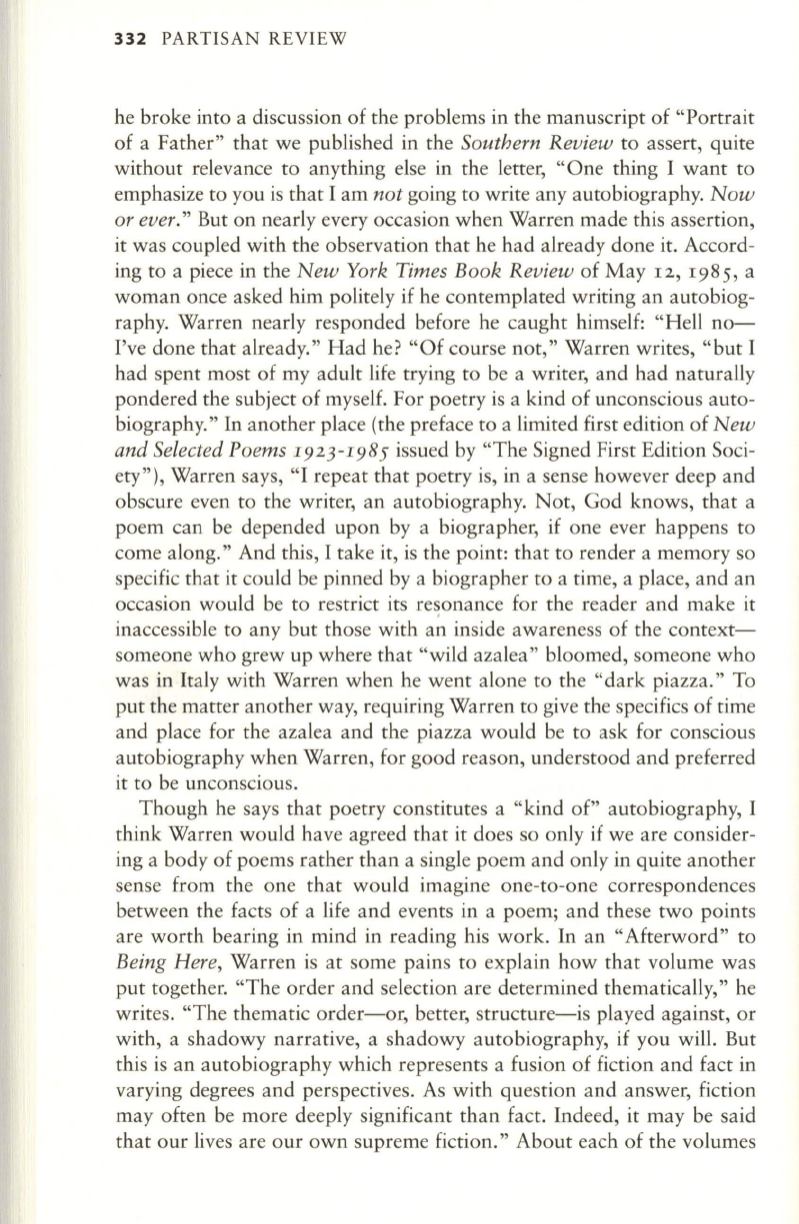
332
PARTISAN REVIEW
he broke into a discussion of the problems in the manuscript of "Portrait
of a Father" that we published in the
Southern Review
to assert, quite
without relevance to anything else in the letter, "One thing I want to
emphasize to you is that I am
not
going to write any autobiography.
Now
or ever."
But on nearly every occasion when Warren made this assertion,
it was coupled with the observation that he had already done it. Accord–
ing to a piece in the
New York Times Book Review
of May
12,
I985,
a
woman once asked him politely if he contemplated writing an autobiog–
raphy. Warren nearly responded before he caught himself: "Hell no–
I've done that already." Had he? "Of course not," Warren writes, "but I
had spent most of my adult life trying to be a writer, and had naturally
pondered the subject of myself. For poetry is a kind of unconscious auto–
biography."
In
another place (the preface to a limited first edition of
New
and Selected Poems
I923-I985
issued by "The Signed First Edition Soci–
ety"), Warren says, "I repeat that poetry is, in a sense however deep and
obscure even to the writer, an autobiography. Not, God knows, that a
poem can be depended upon by a biographer, if one ever happens to
come along." And this, I take it, is the point: that to render a memory so
specific that it could be pinned by a biographer to a time, a place, and an
occasion would be to restrict its resonance for the reader and make it
inaccessible to any but those with an inside awareness of the context–
someone who grew up where that "wild azalea" bloomed, someone who
was in Italy with Warren when he went alone to the "dark piazza ." To
put the matter another way, requiring Warren to give the specifics of time
and place for the azalea and the piazza would be to ask for conscious
autobiography when Warren, for good reason, understood and preferred
it to be unconscious.
Though he says that poetry constitutes a "kind of" autobiography, I
think Warren would have agreed that it does so only if we are consider–
ing a body of poems rather than a single poem and only in quite another
sense from the one that would imagine one-to-one correspondences
between the facts of a life and events in a poem; and these two points
are worth bearing in mind in reading his work.
In
an "Afterword" to
Being Here,
Warren is at some pains to explain how that volume was
put together. "The order and selection are determined thematically," he
writes . "The thematic order-or, better, structure-is played against, or
with, a shadowy narrative, a shadowy autobiography, if you will. But
this is an autobiography which represents a fusion of fiction and fact in
varying degrees and perspectives. As with question and answer, fiction
may often be more deeply significant than fact. Indeed, it may be said
that our lives are our own supreme fiction ." About each of the volumes


